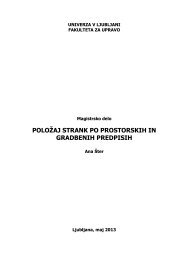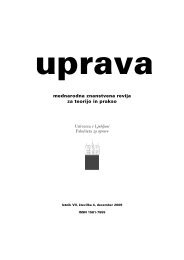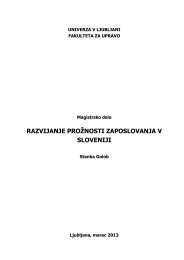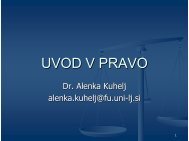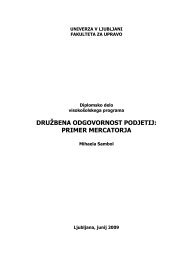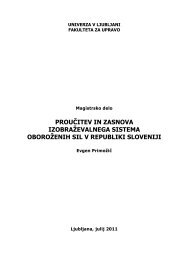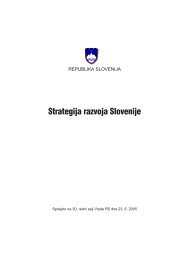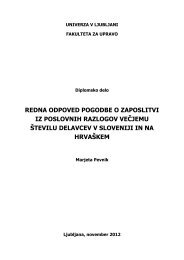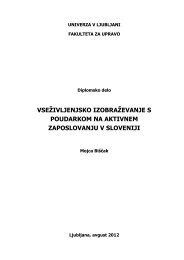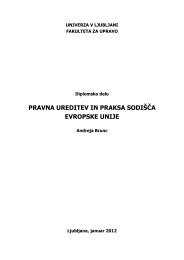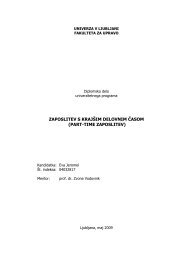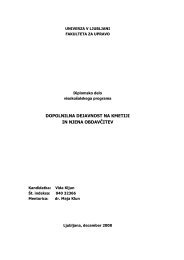socialni transferji družinam, oblike in uÄinki v izbranih državah eu
socialni transferji družinam, oblike in uÄinki v izbranih državah eu
socialni transferji družinam, oblike in uÄinki v izbranih državah eu
Create successful ePaper yourself
Turn your PDF publications into a flip-book with our unique Google optimized e-Paper software.
SUMMARYSOCIAL TRANSFERS TO FAMILIES, FORMS IN EFFECTS IN SELECTEDCOUTRIES EUIn my thesis, I presented the family benefits <strong>in</strong> chosen countries of the European Union,which a family, as the basic unit of human society, is entitled to. Family benefits are socialtransfers, which assure the well-be<strong>in</strong>g of children and the economic solidity of families.I found out that child benefit is the family benefit, with which most families <strong>in</strong> Sloveniaare familiar, and also the most commonly received. It is granted on the basis of monthly<strong>in</strong>come of the parents. In addition to child benefit, we also have the follow<strong>in</strong>g familybenefits: parental allowance, birth grant, large family allowance, child care allowance fora child who needs special care and protection, and partial payment for lost <strong>in</strong>come. TheGerman family policy also dest<strong>in</strong>es the right of child allowance to families, but this differsfrom the Slovenian one with regard to the purpose of determ<strong>in</strong>ation and child age. Inaddition to child benefit, the German family policy also has the follow<strong>in</strong>g benefits: for childcare, for upbr<strong>in</strong>g<strong>in</strong>g, for children, for s<strong>in</strong>gle-parent families, subsidies for special familyholidays, support for education, support for families <strong>in</strong> reduc<strong>in</strong>g the cost of the rental orpurchase of suitable hous<strong>in</strong>g; they have an organized system and childcare services,which, everybody from the local communities to representatives of religious communities,are responsible for provid<strong>in</strong>g. France grants child benefit to the families, on the basis ofthe number of children <strong>in</strong> the family, <strong>in</strong> pr<strong>in</strong>ciple from the second child on, and age of thechildren. Families are also eligible for other family benefits, which are divided <strong>in</strong>to severalcategories: support for a child at an early age, family <strong>in</strong>come supplements, hous<strong>in</strong>gallowances, allowances for special education, allowances for family support, allowancesfor school supplies, allowances for lone parents and allowances for parental presence.Family benefits differ from one another among the Member States, regard<strong>in</strong>g content andimplementation, but are similar <strong>in</strong> purpose and effect. The legislation allows the MemberStates to regulate the amount of family benefits, but with<strong>in</strong> the limits of the law. Indeterm<strong>in</strong><strong>in</strong>g the amount of family benefits, <strong>in</strong> general, all countries consider the numberof children <strong>in</strong> the family, children's age and family <strong>in</strong>come. Based on these criteria, theeffects of family benefits can be determ<strong>in</strong>ed.Ključne besede: Family benefits, child benefit, parental benefit, birth grant, large familyallowance, child care allowance for a child who needs special care and protection, partialpayment for lost <strong>in</strong>come.vi




